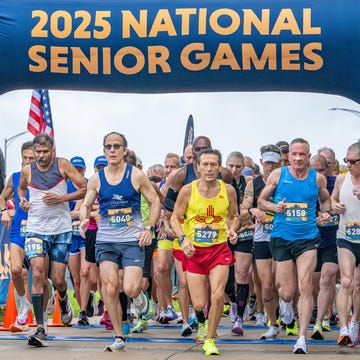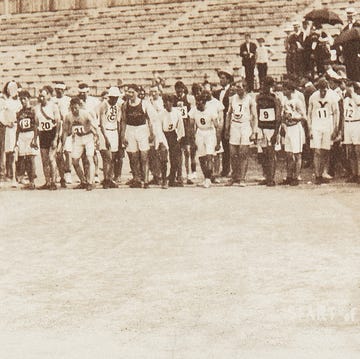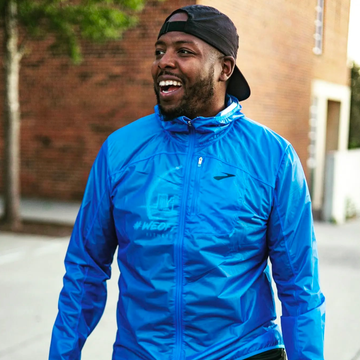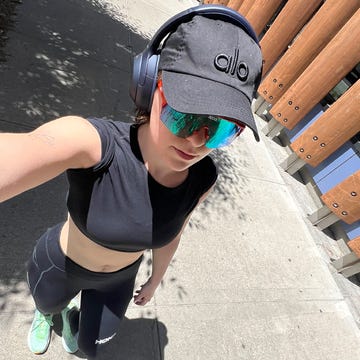For Kate Grace, the route back to the Olympic Trials started with the “D” heat of the women’s 800 meters at the LA Grand Prix on May 17. It was her first race for nearly three years, since September of 2021, after she struggled with long COVID in the early part of 2022 and then gave birth to her first child, son River, in 2023.
Grace won the heat in 2:01.93, well ahead of the-second place runner, Addy Townsend of Canada, who ran 2:03.68. About 90 minutes later, Grace ran the “C” heat of the 1500 meters, finishing fifth in 4:11.92.
The 800 meters will be her focus when the Olympic Trials begin in less than five weeks, and Grace, 35, was pleased with her season opener. “Happy, not ecstatic,” she said, and she cited the famous Jim Carrey clip from the movie Dumb and Dumber: “So you’re saying there’s a chance.”
When she spoke to Runner’s World two days after her races, Grace said her calves were still a little sore from wearing spikes, and she had given herself a day off after, a concession to her age, in an event that generally favors athletes in their 20s. “The mom thing, I’m very proud of,” she said. “But I feel like the age thing is definitely trickier. It’s doable, but requires me to be super humble and change training where needed.”
Grace knows this could be her last Olympic Trials. She had an injury setback in December—a stress reaction in her sacrum, very common in postpartum athletes. To give herself the best shot at recovering and making the Olympic team, she left the group she was training with, Team Boss in Boulder, Colorado, to coach herself.
“I realized this could be the last six months of my professional running career,” she said. “I think injuries are very clarifying. They remind you of your mortality. I very much know what I want to do with this time, and I don’t want to put off what I’ve been wanting to try for a while.”
Grace says everyone in the elite world does basically the same training, but now that she’s writing her own program, she’s able to adjust it for herself. One example: When she first got back to training, she did a lot of hill work for her hard days, and she stayed on the hills until closer to the beginning of outdoor track racing than many of her competitors do. She feels a double benefit from the hills: fitness and leg strength in a single workout.
“I feel like I was able to be more creative and maybe experiment in a way you can’t as much on a team,” she said. “ When you’re on your own, you have fewer people that you have to think about. If I want to do this, I think this is going to be good for me, I don’t have to think about whether it’s fitting into someone else’s more normal track season schedule.”
She doesn’t hesitate to cut short a workout or cancel it entirely if she thinks she needs more recovery. When she first started her comeback after the stress reaction, she would modify a workout at least once every two weeks. And now that she’s in charge, she doesn’t second-guess herself and worry about her preparation over, say, a missed threshold workout five weeks ago.
“I think the biggest thing as you get a little bit older you have to really understand that your body is going to think it can do everything it used to, but it won’t recover from everything,” she said.
She takes a day off every week—and now she makes sure that falls on a weekend—to better fit with her husband’s work schedule and the childcare they have. Pro running does not always align well with a civilian life; she’s doing her best to make it fit.
Grace has a team of mentors and advisors, some of whom she’s worked with for years. In Boulder, she sometimes goes to morning track workouts with The Track Club, a group of largely sub-elite runners that meets at 7 a.m. When it’s threshold work on the track, she doesn’t mind the early hour—she’s been up with River, anyway. But for top-end speedwork, she’ll wait until a little later in the day, and the club’s coach, Evan Schwartz, will man the stopwatch for her.
This has been a learning period for Grace, and she’s loved that. Every two weeks, she’ll have coffee with Schwartz to discuss her training. “He will ask me clarifying questions in Socratic dialogue-type way,” she said. “I definitely have people I’ve been talking to, and it’s been really really fun.”
Grace says pros are all friends in the tight-knit running community, and she has people to share the miles with. She did a short training stint recently at higher altitude, in Park City, Utah, where she met up with some former Bowerman Track Club teammates. “At the end of the day, we all share this incredible journey together,” she said.
She is still deciding if she’ll race on May 31 in Atlanta, but for sure she’ll race the Portland Track Festival on June 8, hoping to improve upon her 800 time before the Olympic Trials start in Eugene. For now, her training shifts to top gear—lots of repetitions at race pace, with short rest, but making sure she gets enough recovery to benefit from the sessions.
That recovery might take longer than it did eight years ago, when she made the Olympic final in Rio. Or even in 2021, when she missed making the Olympic team, but then went on a tear around Europe, winning three Diamond League meets and setting PRs in the 800 meters (1:57.20) and 1500 meters (4:01.33).
“I still 100 percent believe I can compete with people in this country and the world,” she said. “But I have to be very good about listening to my body.”

Sarah Lorge Butler is a writer and editor living in Eugene, Oregon, and her stories about the sport, its trends, and fascinating individuals have appeared in Runner’s World since 2005. She is the author of two popular fitness books, Run Your Butt Off! and Walk Your Butt Off!













